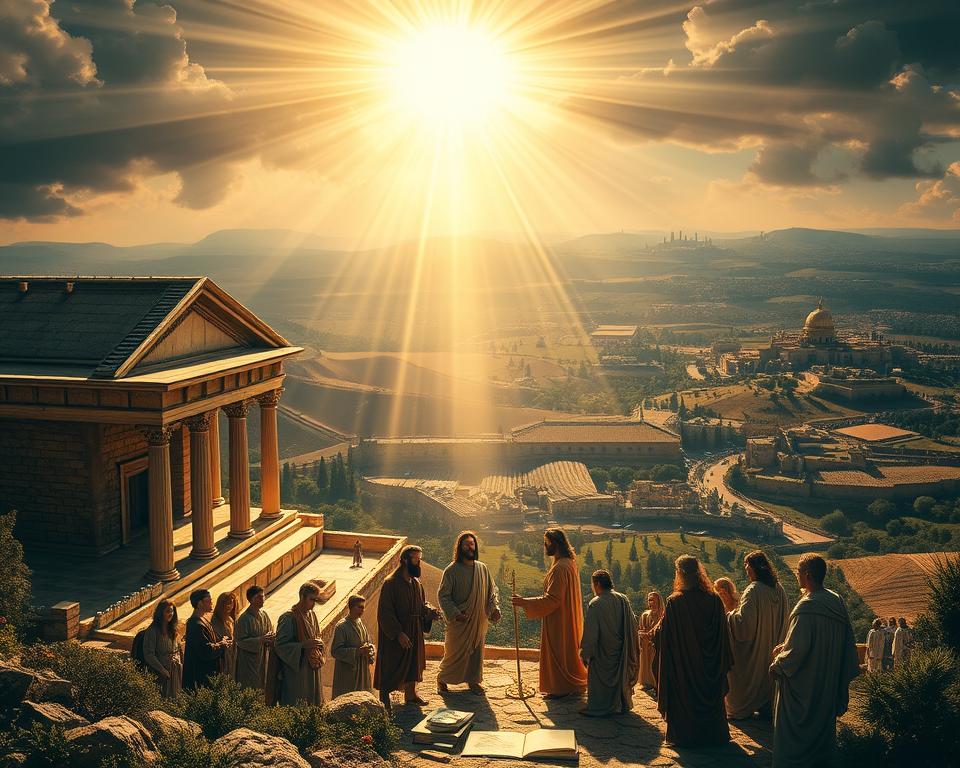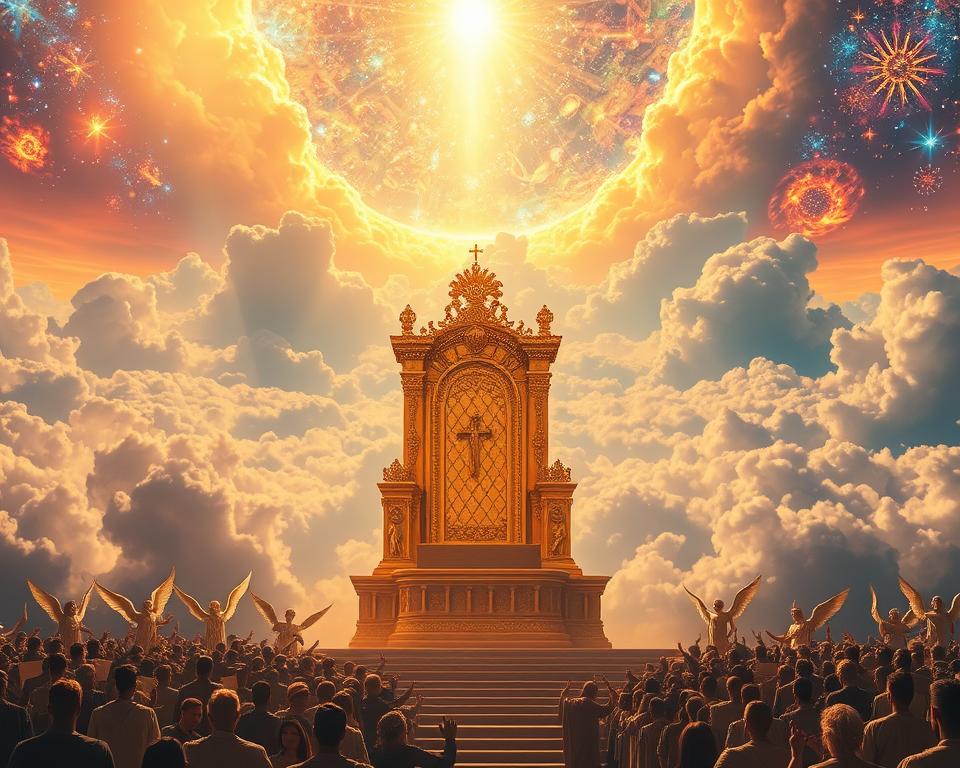Did you know the Bible contains over 300 predictions about Jesus that came true? These prophecies, written centuries before His birth, point to Him as the promised Savior. From Genesis to Malachi, God’s word reveals a divine plan—one fulfilled in the life, death, and resurrection of Christ.
These ancient promises weren’t random guesses. They were precise, from His birthplace to His sacrifice. Scripture shows God’s faithfulness, offering hope and strengthening faith. Understanding these connections deepens your trust in the Bible’s truth.
Whether you’re a lifelong believer or exploring Scripture, these fulfillments matter. They bridge the Old and New Testaments, proving God’s unchanging plan for humanity. Let’s explore how prophecy confirms Jesus as the Messiah.
1. The First Prophecy: Genesis 3:15 and the Defeat of Satan
Right after Adam and Eve’s fall, God gave a promise that echoes through Scripture. In Genesis 3:15, the Lord God declared:
“He shall bruise your head, and you shall bruise His heel.”
This was the first hint of hope—a Savior would come to crush evil forever.

Old Testament Reference: The Seed of the Woman
The “seed of the woman” points directly to Jesus. Unlike other genealogies tracing lineage through men, this prophecy highlights a miraculous birth. Satan’s temporary strike (the “heel”) would pale against the Messiah’s fatal blow (the “head”).
New Testament Fulfillment: Christ’s Victory Over Death
Romans 16:20 confirms this:
“The God of peace will crush Satan under your feet shortly.”
At the cross, Jesus absorbed sin’s sting—a seeming defeat. But His resurrection shattered Satan’s power for good. Hebrews 2:14 explains how Jesus “destroyed him who had the power of death.”
Think of it like a boxing match. The enemy landed a jab (the crucifixion), but Christ delivered the knockout punch (resurrection). Today, you stand on the winning side. Every temptation you resist is a reminder: the serpent’s head is already crushed.
2. The Promised Prophet Like Moses: Deuteronomy 18:15
Centuries before Jesus walked the earth, God promised a prophet like Moses. Deuteronomy 18:15 declared:
“The Lord your God will raise up for you a Prophet like me from your midst, from your brethren. Him you shall hear.”
This wasn’t just another messenger—it was a divine blueprint for the Messiah.
Old Testament Context: A Prophet to Listen To
Moses delivered God’s law, but Israel needed more. They longed for a voice that would guide them beyond the wilderness. Deuteronomy 18:15 assured them: God would raise a prophet who’d speak His word perfectly.
Jewish tradition held that this prophet would precede the Messiah. They watched for someone who’d mediate like Moses—yet greater.

New Testament Fulfillment: Jesus as the Ultimate Prophet
Peter left no doubt in Acts 3:22:
“For Moses truly said to the fathers, ‘The Lord your God will raise up for you a Prophet… Him you shall hear in all things.'”
Jesus didn’t just repeat Moses’ words—He fulfilled them. Where Moses gave temporary laws, Christ offered eternal truth. His “I AM” statements (John 8:58) revealed His divine authority.
- Greater Mediator: Moses interceded for Israel; Jesus intercedes forever (Hebrews 7:25).
- Greater Message: The Sermon on the Mount deepened the Law’s meaning (Matthew 5-7).
- Greater Mission: Moses led to Canaan; Jesus leads to heaven.
At the Transfiguration, God’s command echoed Deuteronomy:
“This is My beloved Son. Hear Him!” (Mark 9:8).
Today, you hear God’s voice through Christ’s words. Every page of Scripture points to Him—the Prophet who is also the Savior.
3. The Virgin Birth: Isaiah 7:14
Isaiah’s prophecy about a virgin birth wasn’t just a prediction—it was a divine sign. In a time of political turmoil, God spoke through Isaiah to King Ahaz:
“Behold, the virgin shall conceive and bear a Son, and shall call His name Immanuel” (Isaiah 7:14).
This promise, given 700 years before Christ, pointed to a miracle beyond human understanding.
Old Testament Prophecy: A Sign from God
Some debate the Hebrew word almah (young woman), but the new testament settles it. Matthew quotes Isaiah using the Greek parthenos—meaning “virgin.” This wasn’t just about Mary’s purity. It was about God breaking into history.
Compare Jesus’ birth to Isaac or Samuel. Their mothers conceived naturally, though barren. Only Jesus’ birth defied biology, proving the spirit lord’s power.
New Testament Fulfillment: Jesus Born of Mary
An angel told Joseph:
“That which is conceived in her is of the Holy Spirit” (matthew 1:1).
Mary’s confusion mirrored Ahaz’s doubt. Yet her faith embraced the impossible. Luke 1:32 confirms Jesus’ divine identity:
“He will be called the Son of the Highest.”
- Historical Context: Ahaz feared enemies; God offered a sign—Immanuel.
- Translation Clarity: Parthenos in Matthew affirms virginity.
- Divine Action: The Holy Spirit overshadowed Mary (Luke 1:35).
When you read Isaiah’s words, see God’s faithfulness. The messiah would come miraculously—not by human will, but by divine plan. Today, “God with us” isn’t just a name. It’s a reality you can trust.
4. The Messiah’s Lineage: 2 Samuel 7:12-16
God made an unbreakable promise to King David that still matters today. In 2 Samuel 7:12-16, He vowed:
“I will establish the throne of his kingdom forever.”
This wasn’t about Solomon or earthly kings. It was a roadmap to Christ.
Old Testament Promise: David’s Eternal Throne
The covenant had three layers. First, David’s seed would rule. Second, this kingdom would last forever. Third, God’s love wouldn’t depart like it did with Saul.
Centuries later, Isaiah echoed this:
“Of the increase of His government… there will be no end” (Isaiah 9:7).
New Testament Fulfillment: Jesus as David’s Descendant
Matthew opens with:
“The book of the genealogy of Jesus Christ, the Son of David” (Matthew 1:1).
Luke’s genealogy traces Mary’s line, showing Jesus’ biological claim. Matthew follows Joseph’s line, affirming His legal right.
- Royal vs. Human: Matthew lists kings; Luke includes overlooked names.
- Virgin Birth Impact: Jesus inherited David’s throne without Joseph’s sin nature.
- Bethlehem Connection: Micah 5:2 tied the messiah would come from David’s hometown.
The angel told Mary:
“The Lord God will give Him the throne of His father David” (Luke 1:32).
At the resurrection, Jesus took His seat—not in Jerusalem, but at God’s right hand (Acts 2:30).
Revelation 22:16 confirms His title:
“I am the Root and the Offspring of David.”
You’re part of this royal family through faith. Every time you pray “Your kingdom come,” you affirm David’s eternal throne—now Christ’s.
5. The Suffering Servant: Isaiah 53
Isaiah 53 paints a vivid picture of suffering that defies human expectations. Written 700 years before Christ, it describes a Messiah who would bear pain silently—not for His sins, but for ours. This chapter remains one of the most quoted Old Testament passages in the new testament, with over 40 direct references.
Old Testament Prophecy: Atonement Through Suffering
Israel expected a triumphant king, but Isaiah revealed a different plan. The lord god declared:
“He was wounded for our transgressions, crushed for our iniquities” (Isaiah 53:5).
Key details stood out:
- Silent Suffering: “As a lamb to the slaughter, He opened not His mouth” (v. 7).
- Substitutionary Death: “The Lord has laid on Him the iniquity of us all” (v. 6).
- Burial with the Rich: “His grave was assigned with wicked men, yet with a rich man in His death” (v. 9).
New Testament Fulfillment: Christ’s Crucifixion
Every detail matched Jesus’ Passion. Peter confirmed this in 1 Peter 2:22-24, quoting Isaiah directly. Here’s how prophecy became reality:
- Scourging: “By His stripes we are healed” (Isaiah 53:5 → John 19:1).
- Silence Before Accusers: Jesus answered nothing during His trial (Mark 14:61).
- Pierced Side: “They will look on Him whom they pierced” (John 19:37 → Zechariah 12:10).
At the Last Supper, Jesus linked Isaiah’s prophecy to the covenant:
“This is My blood of the covenant, poured out for many” (Mark 14:24).
Key Verses and Personal Hope
Matthew 8:17 summarizes Jesus’ mission:
“He took our infirmities and bore our sicknesses.”
When you take communion, remember: He bore your sins. The resurrection proved God’s acceptance of His sacrifice—your guarantee of eternal life.
6. The New Covenant: Jeremiah 31:31
God’s plan for humanity included a revolutionary shift—one foretold through Jeremiah’s words. While the Sinai covenant relied on external laws, Jeremiah 31:31 promised something deeper:
“I will put My law in their minds, and write it on their hearts.”
Old Testament Promise: A Renewed Relationship
The original covenant at Mount Sinai was like a marriage contract etched in stone. Israel repeatedly broke it, proving humanity’s need for divine intervention. Jeremiah’s prophecy offered hope—a future where obedience would flow naturally from transformed hearts.
Key differences emerge:
- Location: Stone tablets vs. human hearts
- Motivation: Fear of punishment vs. love for God
- Scope: National (Israel) vs. global (“all shall know Me”)
New Testament Fulfillment: Jesus’ Blood of the Covenant
At the Last Supper, Jesus lifted the cup and declared:
“This cup is the new covenant in My blood” (Luke 22:20).
His sacrifice accomplished what animal blood couldn’t—permanent forgiveness. Hebrews 8:6-13 explains how Christ became the “Mediator of a better covenant.”
The Holy Spirit now empowers believers to live God’s way naturally. As Paul writes:
“You are an epistle of Christ, written not with ink but by the Spirit” (2 Corinthians 3:3).
Key Verses and Personal Application
When you read Jeremiah 31:31, see God’s desire for intimacy. The law isn’t erased—it’s internalized through Christ’s work. Seventh-day Adventists rightly honor God’s commandments while embracing this heart transformation.
Hebrews 1:5 confirms Jesus’ unique role:
“You are My Son, today I have begotten You.”
This new covenant isn’t just theology—it’s your daily reality. Every time you choose righteousness, you prove Jesus fulfilled Jeremiah’s prophecy.
Want this heart-change? Accept Christ’s sacrifice. Join God’s renewed family today.
7. The Resurrection: Psalm 16:8-11
David’s ancient words in Psalm 16 reveal a hope that death wouldn’t hold the Messiah. He wrote:
“You will not leave my soul in Sheol, nor will You allow Your Holy One to see corruption” (Psalm 16:10).
This wasn’t just poetry—it was a divine guarantee. Centuries later, Peter proved Jesus fulfilled it.
Old Testament Hope: Victory Over Death
David called God’s promised deliverer “Your Holy One”—a title only fitting for Christ. While David died and decayed (Acts 2:29), his words pointed beyond himself. The messiah would conquer death permanently.
Jewish tradition saw Psalm 16 as Messianic. Yet nobody imagined how: a crucified Savior rising bodily. Even Lazarus’ revival (John 11) was temporary—he died again. Jesus’ resurrection broke death’s power forever.
New Testament Fulfillment: Jesus’ Resurrection
At Pentecost, Peter declared:
“David… foreseeing this, spoke concerning the resurrection of the Christ” (Acts 2:31).
Paul echoed this in Acts 13:35-37, noting David’s tomb still existed—but Jesus’ didn’t. The empty tomb wasn’t symbolism. Over 500 witnesses saw the risen Christ (1 Corinthians 15:6).
- Physical Proof: Jesus ate fish (Luke 24:42-43) and showed scars (John 20:27).
- Davidic Link: As David’s descendant, Jesus secured the eternal throne promised in 2 Samuel 7.
- Baptism’s Meaning: Going under water mirrors His death; rising symbolizes new life (Romans 6:4).
Key Verses and Eternal Hope
First Corinthians 15:20 calls Jesus “the firstfruits of those who have fallen asleep.” Seventh-day Adventists cherish this hope—believing the dead rest consciously until resurrection day.
When you face grief, remember: death isn’t final. Christ’s victory guarantees yours. As David prophesied and Jesus accomplished, corruption has no claim on God’s people.
8. The Significance of New Testament Prophecy Fulfillment
The odds of these events happening by chance are astronomical—1 in 1017. Over 300 predictions in Scripture point to Jesus, proving God’s word never fails.
These fulfillments bridge Testaments, showing unity in God’s plan. Early believers used them to share faith. Today, they strengthen your trust in divine truth.
For Adventists, prophecy confirms Christ’s soon return. For the Jewish people, it opens dialogue about the Messiah. For the world, it offers hope beyond human plans. As believers explore these diverse perspectives, they find common ground in the transformative power of faith. The unfolding of events, as outlined in scripture, can lead to deeper understanding and connection among different cultures and traditions. Moreover, through discussions about the future, the significance of the ‘bible prophecies of peace explained‘ becomes apparent, highlighting a shared yearning for harmony in a fractured world.
Open your Bible. Trace these threads yourself. Then share how God’s word changes lives—yours included.
Prayer: “Lord, reveal Your truth through these prophecies. Use them to draw others to You.”





